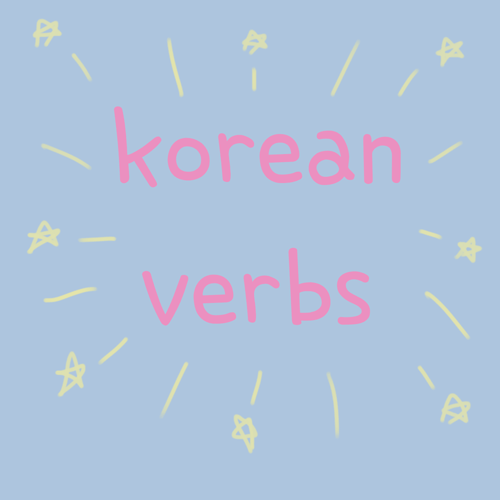twitter @Dilfsoul•wattpad @Jaebummeansdaddy• Ao3 @Swizzle_Dazzle•16• Bts got7 monsta x EXO enthusiast•
Don't wanna be here? Send us removal request.
Text


Horsewon just wants some love (credit to @vampvladknight whos too much of a whimp to upload these himself)
34 notes
·
View notes
Video
youtube
In tonight’s episode of Rap of China 4 contestants had to choose 1 out of 4 guests to collaborate with. Gai collaborated with Jackson using a track Jackson prepared ‘Papillon.’ Their team won and scored 97 points. Episode will be subbed by GalaxySubbingTeam later.
263 notes
·
View notes
Text
BASIC KOREAN SENTENCE STRUCTURE
♡ in korean, it is important to use the correct sentence structure, or your sentences may seem really confusing :
-> in english : Subject Verb Object -> in korean : Subject Object Verb
now, let’s look at some examples!
we are gonna use this simple sentence : “i bought a book”, in korean it would be : “i a book bought”
저는 책을 샀어요 책 = book 샀어요(past tense) from the verb 사다 = to buy it’s really different, right?
⚠ the object ALWAYS comes BEFORE the verb, and the verb is ALWAYS at the END of the sentence. ⚠
♡ locations are also used BEFORE verbs :
“저는 학교에 가요” i go to school 학교 = school 에= location particle (to) 가요 (present tense) from the verb 가다 = to go
“저는 학교에�� 공부해요” i study at school 학교 = school 에서 = location particle (at) 공부해요 (present tense) from the verb 공부하다 = to study
“저는 집에 잤어요” i slept at home 집 = home 에 = location particle (at) 잤어요 (past tense) from the verb 자다 = to sleep
⚠ you can put the time before or after the subject though :
both of these sentences mean “today I will eat at home” :
before -> 오늘 저는 집에서 먹을 거예요 after -> 저는 오늘 집에서 먹을 거예요 오늘 = today 집 = home 에서 = location particle (at) 먹을 거예요 (future tense) from the verb 먹다 = to verb
“tomorrow, i will study at school” before -> 내일 저는 학교에서 공부할 거예요 after -> 저는 내일 학교에서 공부할 거예요 내일 = tomorrow 학교 = school 에서 = location particle (at) 공부하다 = to study ~ㄹ 거예요 (future tense)
♡ adverbs are added before verbs : 저는 열심히 공부해요 I study hard 열심히 = hard
and finally, adjectives work the same way as they do in english! just put them before the noun they describe :
매운 라면 = spicy ramen 매운 = spicy 라면 = ramen
예쁜 여자 = beautiful woman 예쁜 = beautiful 여자 = woman

12K notes
·
View notes
Text
KOREAN INTERNET SLANGS/SHORTENED WORDS📱💭
1. KOREAN INTERNET, TEXTING SLANGS
ㅋㅋ ♡ “kk” sound of giggling/laughing
ㅠㅠ, ㅜㅜ ♡ crying/sad eyes
흑 ♡ sobbing sound
ㅎㅎ (하하) ♡ “haha” sound of laughing
ㅍㅎㅎ ♡ “puhaha” sound of laughing
ㅇㅇ (응) ♡ uh, yeah
ㅇㅋ (오키) ♡ okay
ㄱㅅ (감사) ♡ thank you
ㅊㅋ (축하) ♡ congrats
ㄴㄴ (노노) ♡ no
ㅈㅅ (죄송) ♡ sorry
ㄱㄷ (기다려) ♡ wait
ㄱㄱ (고고) ♡ gogo, let’s go
ㅂㅂ (바이바이) ♡ bye bye /or/ ㅂㅇ (바이) ♡ bye
ㅅㄱ (수고) ♡ good job
ㅇㄷ (어디) ♡ where
ㅗㅗ ♡ 🖕🏼 lol
ㅎㅇ (하이) ♡ hi
ㅎㄹ ♡ hello
ㄱㅊ (괜찮아) ♡ it’s fine
ㄷㅊ (닥쳐) ♡ shut up
ㅡㅡ ♡ to express displeasure
2. SHORTENED WORDS
낼 (내일) ♡ tomorrow
짐 (지금) ♡ now
담 (다음) ♡ next
첨 (처음) ♡ first
넘 (너무) ♡ very
좀 (조금) ♡ a little
울 (우리) ♡ we
걍 (그냥) ♡ just
어케 (어떻게) ♡ how
글고 (그리고) ♡ and
젤 (제일) ♡ most, best
먄 (미안) ♡ sorry
짱나 (짜증나) ♡ annoying
글쿤 (그렇구나) ♡ i see
열공 (열심히 공부해) ♡ study hard
재밌다 (재미있다) ♡ to be fun, interesting
알써 (알겠어) ♡ i understand, get i
몰겠어 (모르겠어) ♡ i don’t know
올만이네 (오랜만이네) ♡ long time no see

22K notes
·
View notes
Photo

Korean Grammar - Verbs [Part 3/∞]
At long last, here’s a list of some very common verbs in Korean!~
Enjoy!
*remember to try and sound out each word before peeking at the romanization!~
오다 (oh da) - to come
가다 (ga da) - to go
먹다 (meok da) - to eat
마시다 (ma shi da) - to drink
주다 (joo da) - to give
갖다 (gaj da) - to have
받다 (bad da) - to receive
배우다 (bae woo da) - to learn
가르치다 (ga reu chi da) - to teach
공부하다 (gong bu ha da) - to study
연습하다 (yeon seub ha da) - to practice
일하다 (il ha da) - to work
준비하다 (joon bi ha da) - to prepare
앉다 (anj da) - to sit
운동하다 (oon dong ha da) - to exercise
쉬다 (shwi da) - to rest
일어나다 (yi reo na da) - to stand up
걷다 (geot da) - to walk
달리다 (dal li da) - to run
춤추다 (choom chu da) - to dance
일어나다 (yi reo na da) - to wake up
자다 (ja da) - to sleep
꿈꾸다 (kkum kku da) - to dream
악몽 꾸다 (ak mong kku da) - to have a nightmare
울다 (ool da) - to cry
웃다 (oot da) - to smile/laugh
듣다 (deud da) - to listen/hear
말하다 (mal ha da) - to talk, speak
보다 (bo da) - to see
감다 (gam da) - to close (one’s eyes)
빌리다 (bil li da) - to lend/borrow
돌려주다 (dol ryeo joo da) - to return
열다 (yeol da) - to open
닫다 (dat da) - to close to open
사다 (sa da) - to buy
내다 (nae da) - to pay
팔다 (pal da) - to sell
신다 (shin da) - to wear (shoes, socks, footwear)
입다 (ib da) - to wear (clothes)
벗다 (beot da) - to remove/take off/undress (clothes)
이기다 (yi gi da) - to win
지다 (ji da) - to lose
읽다 (ilk da) - to read
쓰다 (sseu da) - to write/to wear
기억하다 (gi yeok ha da) - to remember
잊다 (it da) - to forget
시작하다 (shi jak ha da) - to start
끝나다 (kkeut na da) - to finish
묻다 (moot da) - to ask
대답하다 (dae dab ha da) - to answer
출발하다 (chul bal ha da) - to depart
도착하다 (do chak ha da) - to arrive
생각하다 (saeng gak ha da) - to think
알다 (al da) - to know
모르다 (mo reu da) - to not know
결혼하다 (gyeol hon ha da) - to marry
축하하다 (chuk ha ha da) - to congratulate
태어나다 (tae eo na da) - to be born
살다 (sal da) - to live
헤어지다 (hae eo ji da) - to separate
운전하다 (oon jeon ha da) - to drive
좋아하다 (joh ah ha da) - to like
싫어하다 (shil eo ha da) - to dislike
사랑하다 (sa rang ha da) - to love
미워하다 (mi wo ha da) - to hate
있다 (yit da) - to have
없다 (eob da) - to not have
들어오다 (deul eo oh da) - to enter
나가다 (na ga da) - to exit
씻다 (shid da) - to wash
청소하다 (cheong so ha da) - to clean
약속하다 (yak sok ha da) - to promise
거짓말하다 (geo jit mal ha da) - to lie
고백하다 (go baek ha da) - to confess
요리하다 (yo ri ha da) - to cook
끓이다 (kkeul yi da) - to boil
썰다 (sseol da) - to chop, slice
튀기다 (twi gi da) - to (deep) fry
재다 (jae da) - to measure, weigh
섞다 (seok da) - to mix, blend
굽다 (gub da) - to roast, grill, bake
볶다 (bokk da) - to stir fry
찌다 (jji da) - to steam
휘젓다 (hwi jeot da) - to stir
까다 (kka da) - to peel
만나다 (man na da) - to meet
주문하다 (joo mun ha da) - to order
전화하다 (jeon hwa ha da) - to make a phone call
타다 (ta da) - to ride
필요하다 (pil yo ha da) - to need
도와주다 (do wa joo da) - to help
하다 (ha da) - to do
걱정하다 (geok jeong ha da) - to worry
보내다 (bo nae da) - to send
사용하다 (sa yong ha da) - to use
싸우다 (ssa woo da) - to fight
Hope this helps and happy studying!~
[p/c 19tc.tumblr.com]
12K notes
·
View notes
Text
Mega Vocabulary List
Ready for the ultimate challenge? If you’ve been following from the start, then this year’s worth of vocabulary shall prove a mighty challenge for you - see how many words you can remember. Otherwise, if you’re new, here is a very long list of vocabulary to get you started! Good Luck!
꿈: Dream
여행: Travel
시험: Exam
계획: Plan
찾다: To find
기분: Feelings
쉽다: To be easy
고민: One’s worries
의자: Chair
차: Car
책: Book
탁자: Table
도시: City
건물: Building
잡지: Magazine
나라: Country
가방: Bag
선생님: Teacher
나무: Tree
창문: Window
문: Door
의사: Doctor
Keep reading
11K notes
·
View notes
Photo

ALERT! The band, Seventeen, will be doing Tumblr’s first ever KPop Answer Time this Friday 8/25 at 2 PM PST // 5 PM EST!!! Ask away here!
17K notes
·
View notes
Text
✒ "because/so.." in korean (그래서, ~서..)
♡ verb stem + 아서/어서/해서 (=그래서) 그래서 means “because”, “so”… it’s an adverb which allows you to link two sentences linking causes and effects.
1. 저는 너무 먹었요. 그래서 배가 아파요. 2. 저는 너무 먹어서 배가 아파요.
both 1 and 2 mean “because i ate too much, my stomach hurts” or also “i ate too much, so my stomach hurts”.
in the first sentence, we used the adverb 그래서 to express “because/so”, whereas in the second sentence we attached ~어서 to the verb stem.
let’s learn how to build this with other verbs !
🌼 좋다 (to be good) 좋-다 좋+아서 좋아서 = because it’s good
🌼 많다 (to be many, much, a lot..) present -> 많아요 remove 요 put 서 instead 많아서 = because there is a lot
🌼 만나다 (to meet) present -> 만나요 remove 요 put 서 instead 만나서 = because i meet
🌼 좋아하다 (to like) present -> 좋아해요 remove 요 put 서 instead 좋아해서 = because i like
🌼 예쁘다 (to be pretty) present -> 예뻐요 remove 요 put 서 instead 예뻐서 = because it’s pretty
♡ more examples :
🌼 한국어가 어려워서 매일 공부해요 1. because korean is difficult, i study everyday. 2. korean is difficult, so i study everyday. 한국어 - korean language 어렵다 - to be difficult 매일 - everyday 공부하다 - to study
🌼 저는 영화를 좋아해서 많이 봐요. 1. because i like movies, i watch a lot. 2. i like movies, so i watch a lot. 영화 - movie 많이 - a lot 보다 - to watch/see
🌼 저는 배고파서 우리 ��마는 요리할 거에요. 1. because i am hungry, my mom will cook. 2. i am hungry, so my mom will cook. 배고프다 - to be hungry 우리 - our, my 요리하다 - to cook 엄마 - mom
good luck!🤷💬
2K notes
·
View notes
Photo









Boyfriend material Jaebum
#rip jaebum stans#Im jaebum#defsoul#got7 jb#kpop#I'm dying#I'm in love can you believe#임재범#갓세븐#Mark tuan#Jackson wang#park jinyoung#choi youngjae#bambam#kunpimook bhuwakul#Kim yugyeom#vlive#def의
8 notes
·
View notes
Text
gonna post some vocab and grammar before i leave for my trip! yay
6 notes
·
View notes



















